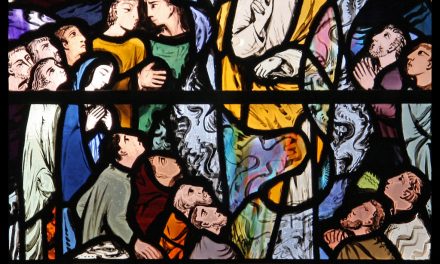Responsorial Psalm – Psalm 47:2-3, 6-7, 8-9
Second Reading – Ephesians 1:17-23
Gospel Reading – Matthew 28:16-20
I think it is appropriate that we are celebrating the Solemnity of the Ascension on the same weekend that we are also celebrating commencement at Marquette University (where I work). It strikes me that there are curious, and revealing, parallels between these two experiences.
To begin, there is a reason we refer to the graduation festivities as “commencement.” While students are often instinctually retrospective as they approach commencement weekend, the thrust of our institutional message to them—beginning with the name of the celebration itself—is intentionally forward-looking. As much as our students are often sad to leave, they slowly come to recognize that the change they are facing is both a necessary and a beneficial one.
I suspect that the disciples had a similar reaction to Jesus’s departure, when he prepared to ascend into heaven. After all, they had just experienced the death of Jesus a short 40 days prior, and thus already once had to face the prospect of never seeing their beloved friend and teacher again. Then, they had 40 days to enjoy his company, and then he departs with what is best described as a “vague” reassurance (at least with respect to the timeline) that he’ll be back.
As much as this must have been disorienting, it also carried with it a forward-looking message. As the story is recounted in Acts of the Apostles, Jesus insists that his disciples are not to disappear, but should instead “wait for ‘the promise of the Father…[because] in a few days you will be baptized with the Holy Spirit.’” In Matthew’s telling, meanwhile, Jesus instructs his followers to “go, therefore, and make disciples of all nations.” In both cases, he gives them some work to do in the time ahead.
This forward-looking vision and call suggest a kind of “commencement” like experience for the disciples, who must deal with a dramatic departure that is ultimately both necessary and beneficial.
The necessity is clear from Jesus’s comments in today’s first reading, which suggest that his time has come to its (initial) end, and that he must go back to be with the Father in heaven. Theologically, see this same necessity in John’s Gospel, where Jesus insists that he must leave to be with the Father. In that context, he also suggests that his departure will be to his followers’ benefit, for it will allow him to send the paraclete, his “advocate,” to be with them in a new way.
There is a significant way in which the painful departure of Jesus, much like the painful departure from campus facing my graduating students, is a necessary pain that opens up new avenues for growth. Like ripping off the band-aid, it is a temporary interruption that stuns at first but which makes the fullest potential a possibility again.
The impact of this change is clear in the second reading from Ephesians, which powerfully describes how God “put all things beneath [Jesus’s] feet and gave him as head over all things to the church, which is his body, the fullness of the one who fills all things in every way.” We are as followers of Christ able to be his body, as the church, in a whole new way after the Ascension, for can no longer count on Jesus to do all the work for us. Instead, we are left to take the initiative, just our seniors will need to take the reins to lead their lives in new directions after graduation.
As we celebrate the Ascension, then, let us think about how we are called to a new way of life that allows us to serve others in a way we had not been able to do when we knew we could rely on someone else to chart the path forward for us. Let us not be afraid of what we lose by these changes, but inspired by what we might yet accomplish with the support of the one who, even in his absence, fulfills his promise to be “with you always, until the end of the age.”




